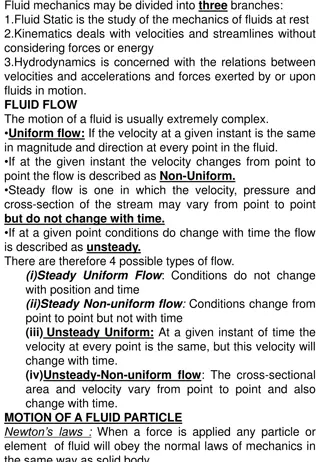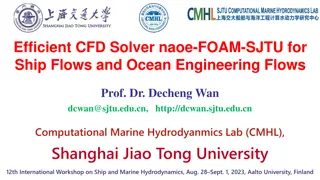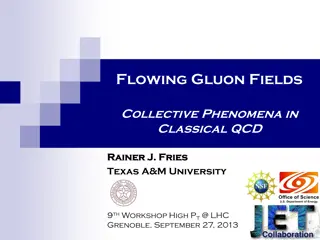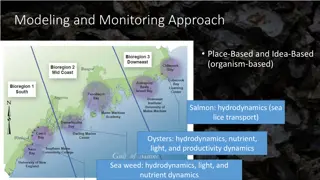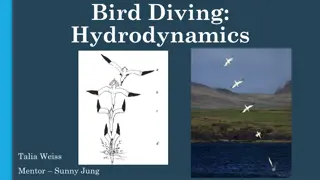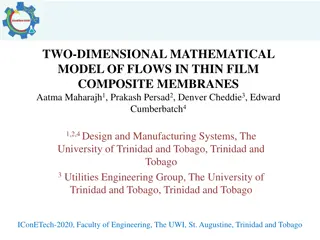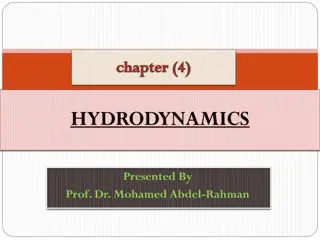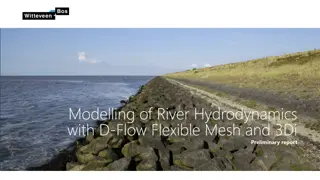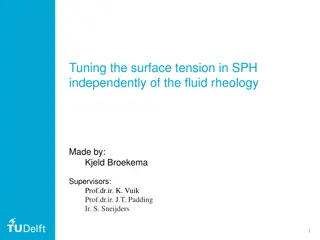Overview of Fluid Mechanics: Branches, Flow Types, and Equations
Fluid mechanics is subdivided into three branches: Fluid Static, Kinematics, and Hydrodynamics. The study of fluid flow includes different types such as uniform, non-uniform, steady, and unsteady flow. The motion of fluid particles obeys Newton's laws, and the conservation of mass and energy plays a
23 views • 4 slides
Efficient CFD Solver for Ship and Ocean Engineering Flows
Computational Marine Hydrodynamics Lab (CMHL) at Shanghai Jiao Tong University specializes in developing advanced CFD solvers for ship and ocean engineering applications. They focus on research areas like ship hydrodynamics, ocean engineering, offshore wind turbine systems, and more. The lab works o
5 views • 7 slides
Flowing Gluon Fields and Color Glass Phenomena in QCD
Explore the collective phenomena of gluon fields in classical QCD, focusing on the Standard Model of URHICs, Color Glass, and Gluon Fields in the Forward Lightcone. The research delves into topics like local thermal equilibrium, viscous hydrodynamics, and the interaction of probes with quarks and gl
3 views • 24 slides
Aquaculture Modeling and Monitoring Approach in Coastal Ecosystems
This comprehensive modeling and monitoring approach focuses on understanding hydrodynamics, nutrient dynamics, and productivity in various organisms like salmon, oysters, and sea weed. Through data compilation, stakeholder involvement, and site selection informed by aquaculture, the project aims to
0 views • 15 slides
Collective Excitations in QCD Plasma: Hydrodynamic Regime Overview
This research presentation by Ali Davody and collaborators from Regensburg University explores collective excitations in QCD plasma, focusing on chiral hydrodynamics, magnetic and vortical waves, hydrodynamic excitation descriptions, and modes derived from kinetic theory. The study delves into the d
2 views • 33 slides
Investigating the Forces and Deceleration in Bird Diving Hydrodynamics
Research explores the impact acceleration and forces involved when birds dive into water, focusing on gannets. Conflicting data regarding deceleration post-impact highlights the need for further study to match experimental findings with theoretical models and gain insight with simpler models.
3 views • 18 slides
Two-Dimensional Mathematical Model of Flows in Thin Film Composite Membranes
This study presents a mathematical model for flows in thin film composite membranes, focusing on the permeation of solvent flux and solute rejection. Assumptions include incompressible fluid, constant diffusion of chemical species, and isothermal conditions. Equations describe water flux, solute flu
1 views • 19 slides
Hydrodynamics: Bernoulli's Equation and Fluid Flow Analysis
Understanding Bernoulli's equation in hydrodynamics is key to analyzing fluid flow dynamics. As a fluid moves through varying pipe conditions, pressure, speed, and elevation interact to maintain a constant total energy. This principle, expressed in Bernoulli's equation, showcases the relationship be
4 views • 16 slides
Holographic Description of Lifshitz Fluids and Black Holes
The study explores the correspondence between black holes and fluids in the context of hyperscaling-violating Lifshitz hydrodynamics. It delves into Lifshitz spacetimes, their holographic descriptions, and the fluid/gravity correspondence for Lifshitz spacetimes. The Einstein-Maxwell-Dilaton model a
1 views • 18 slides
Baseline Drag Force Correlation in Gas-Solid Systems
Study on drag force correlations for CFD simulations in gas-solid systems, exploring particle dynamics affected by hydrodynamics, morphology, and agglomerative phenomena. Models proposed to satisfy close-pack and single-particle extremes.
2 views • 18 slides
Efficient CFD Solver for Ship and Ocean Engineering
Computational Marine Hydrodynamics Lab (CMHL) at Shanghai Jiao Tong University focuses on developing advanced CFD methods for marine hydrodynamics, CAE software, and their applications in ship, marine structures, offshore renewable energy, and more. This includes features like the development of SST
0 views • 7 slides
Enstrophy and AdS4 Black Branes: Avant-Garde Methods for QFT and Gravity
Explore the avant-garde methods of using enstrophy and AdS4 black branes in the realms of quantum field theory and gravity, shedding new light on relativistic hydrodynamics and its correspondence with gravity. Dive into the manifestation of enstrophy in the gravity dual, unraveling the interplay bet
1 views • 16 slides
River Hydrodynamics Modelling with D-Flow Flexible Mesh and 3Di
Explore the preliminary report on modelling river hydrodynamics using D-Flow Flexible Mesh and 3Di, including assumptions, equations, research questions, and test models to understand the processes and influences involved in 2D hydraulic engineering simulations.
3 views • 14 slides
Tuning Surface Tension in SPH Independently of Fluid Rheology
Explore the independent tuning of surface tension in Smoothed Particle Hydrodynamics (SPH) through particle interaction forces. Investigate the impact on fluid rheology using numerical experiments and rheological properties.
1 views • 19 slides
Relativistic Viscous Hydrodynamics for Multi-Component Systems in Heavy Ion Collisions
Explore the application of relativistic viscous hydrodynamics in heavy ion collisions, focusing on the Quark-Gluon Plasma (QGP) and its space-time evolution. Learn about the formulation, results, and implications of this advanced hydrodynamic modeling approach.
3 views • 34 slides
Newtonian Fluid Dynamics: Euler Formulation and Analysis
Dive into the principles of Newtonian fluid dynamics with a focus on Euler's formulation and analysis, encompassing Newton's equations for fluids, continuity equation, irrotational and incompressible fluids, and more. Explore the physical relationships, origins, and applications of key concepts in h
3 views • 36 slides
Bulk Viscosity Effects at Freezeout in Hot/Dense QCD Matter
Explore the impact of bulk viscosity at freezeout in hot/dense QCD matter through ideal and viscous hydrodynamics at the Nagoya Mini Workshop. Topics covered include quark-gluon plasma, Cooper-Frye formula, kinetic theory, and numerical results. The study highlights the importance of understanding t
3 views • 22 slides
Viscous Hydrodynamics in Relativistic Heavy Ion Collisions
Explore the application of viscous hydrodynamics in understanding the properties of Quark-Gluon Plasma (QGP) during relativistic heavy ion collisions. Delve into topics such as relativistic dissipative hydrodynamics, constitutive equations in multi-component systems, and the investigation of non-equ
4 views • 26 slides
Kyoto Workshop on Hydrodynamics of Low-Dimensional Interacting Systems
Explore the advancements, challenges, and future directions in hydrodynamics at the Kyoto workshop on low-dimensional interacting systems. Join us for insightful discussions and presentations by leading experts in the field. Free time for networking and self-organized sessions.
3 views • 9 slides
